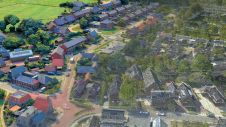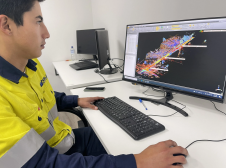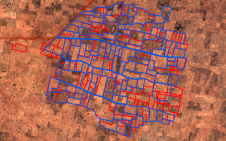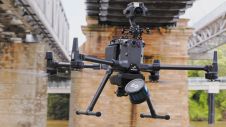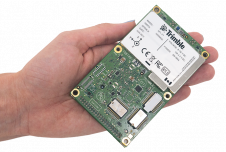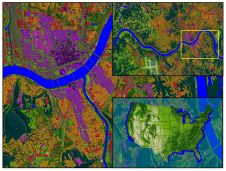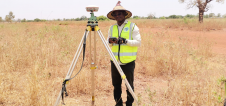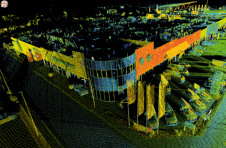Network-based GPS Survey in Japan
In 2000, geodetic datum of Japan was shifted to the world datum (ITRF Coordinate System) and since the year 2002 authorised Electric Reference Stations (ERS) coordinates and their daily observation data have been released to the public via the internet. The ERS are fixed receiving stations for GPS signals and are serving as new national reference points. As of January 2005, 1,224 stations have been allocated all over the country, with about 20km spacing, to make a GPS network called the GPS Earth Observation NETwork (GEONET).
The availability of authorised coordinates and daily ERS observations has made practicable network-based GPS surveying using ERS as reference stations. Network-based GPS is a technology to measure in real-time the coordinates of any user station encircled by several reference stations. Error components of pseudo-range observations at reference stations are parameterised and their estimated corrections used to correct pseudo-ranges observed at the user station. Two types of network-based GPS procedures are known in Japan, Virtual Reference Station (VRS) developed by Trimble and FKP by Geo++.
The present author happened to participate in the first demonstration of FKP in Japan about seven years ago. Since then, many demonstrations and exhibitions of both systems have taken place. But because both FKP and VRS have, confusingly, both been termed virtual reference stations, conceptual misunderstandings have spread throughout the surveying business. With VRS, the position of a user station evaluated at one epoch is sent to the analysis centre, which computes virtual pseudo-range corrections from a ‘virtual reference station’ located near the user station. The user station corrects the position using a conventional RTK GPS algorithm. Conversely, FKP involves corrections to parameters of error components estimated at an analysis centre being sent to a user station, where adjustment takes place.
In 2004, survey work based on network-based GPS was officially regulated under the Public Survey Work Regulation of the Ministry of Land, Infrastructure and Transport, which will spur its use not only for map production but also for construction surveying, and hazard prevention and management. VRS and FKP have respective advantages and disadvantages. They seem evenly matched. If the corrections can be broadcast to users, FKP is preferred because it does not need a two-way communication link between user stations and analysis centre and it may be easily adaptable to a moving user station. Currently, VRS is supported on the market by companies including JENOBA Co. Ltd (www.jenoba.jp) and Nippon GPS Solution Corp (www.ngsc.co.jp), while FKP is supported by Mitsubishi Electric Corp. (www.mitsubishielectric.co.jp) and GeoNet Inc. (www.geonetz.com). But considering their strategic importance for land management, this technology should be developed domestically in the future.
Make your inbox more interesting.Add some geo.
Keep abreast of news, developments and technological advancement in the geomatics industry.
Sign up for free

